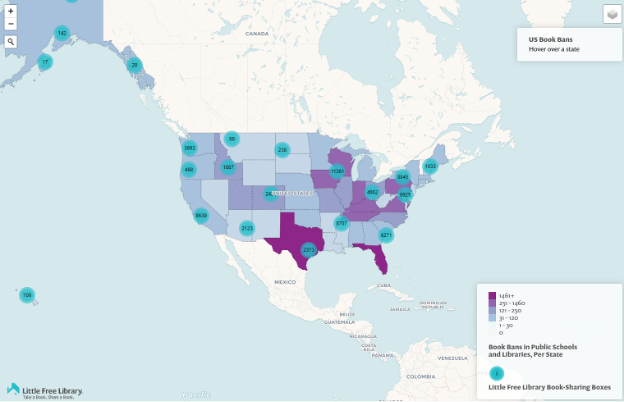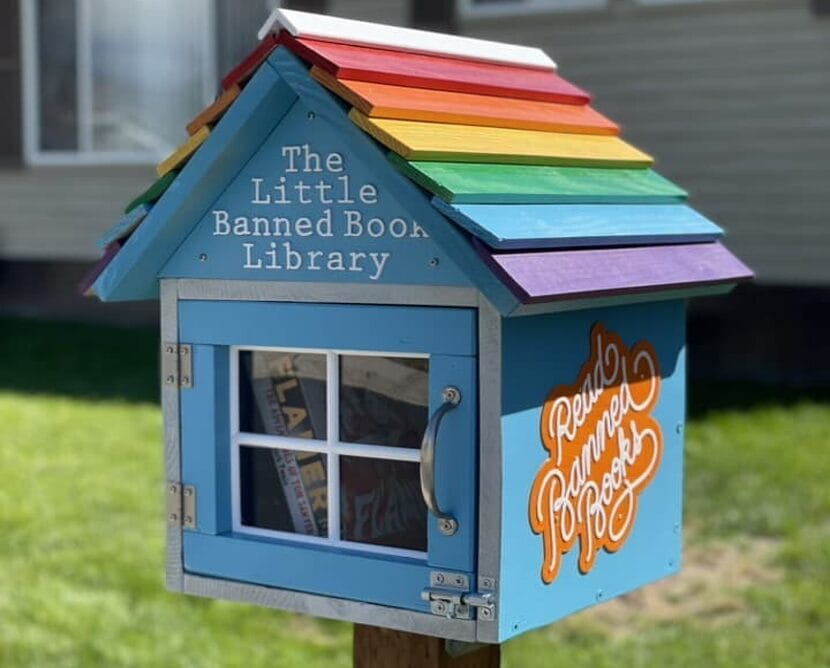By now, you’re sure to have spotted at least one Little Free Library (LFL) in your community. Often colorful and adorned with decorations, these pint-sized book-sharing boxes, over 180,000 strong, allow neighbors to share already read books or find books they may not have seen before. In communities where book bans have taken hold, they can be a lifeline for those seeking to find their lives reflected in stories that others want to hide.
In advance of this year’s Banned Books Week (September 22 – 28), LFL collaborated with the American Library Association’s Office for Intellectual Freedom and PEN America to create an easy-to-navigate map that not only shows the states worst hit by book bans, but also where LFL boxes are installed. Zooming into street level will show book bans and LFL boxes on a more granular level.

“Banned books are welcome in Little Free Library book-sharing boxes,” said LFL Executive Director Greig Metzger. “Our new interactive map allows you to find both the areas hit hardest by book bans and the nearest Little Free Library box locations, where you can share books that have been censored or just books you love. The heart of our mission is to expand access to books, and we hope this map inspires you to provide access to the banned books that are meaningful to you.”
LFL Director of Communications Margret Aldrich said that, while the data “is always interesting (and disheartening), a visualization of that data is especially compelling. We hope our Book Ban Map brings further awareness to the issue of book censorship and drives it home that book bans aren’t only happening in hotspots like Florida and Texas—they could be happening in your state.” If book bans are occurring in your community, Aldrich says “this could be the right time to share a banned book you love.”
Playing it Safe
The map is a new chapter in Little Free Library’s history, which has recently evolved in the book banning era to include donors who specifically stock free libraries with diverse titles, and community groups that fill shelves with titles that reflect their town’s commitment to diversity and representation.
LFL’s mission is “to be a catalyst for building community, inspiring readers, and expanding book access.” Unfortunately, the LFL’s have also faced hate from extremist groups and censorship attempts:
- February 2024: Antisemitic and anti-LGBTQ flyers from the neo-Nazi group Goyim Defense League were left in a Little Free Library in Indianapolis. The flyers read: “Every single aspect of the LGBTQ+ Movement is Jewish.”
- November 2023: A Little Free Library decorated in support of the LGBTQ community – donated and built by local Girl Scouts and on the property of an LGBTQ-owned flowershop in Wake Forest, North Carolina – was cut down and removed. The owners said they’ve also received positive support, and people have made donations to create a more permanent library in its place: “If anything, I think it will launch us forward. I think it will push the community forward and just show others that, you know, to persevere in the face of adversity.”
- September 2023: To comply with Iowa’s Senate File 496 (which fully went into effect last month following a Federal Court of Appeals ruling), two school districts placed disclaimers on LFL boxes on school grounds: “This ‘little library’ is not funded, sponsored, endorsed or maintained by the Urbandale Community School District and is not in any way part of the Urbandale Schools library program.”
- January 2023: The “Little Queer Library” in Waltham, Massachusetts, was repeatedly vandalized. The library hosted LGBTQ-inclusive young adult books. Local news reported vandals ransacking the library at least four times between February and May 2022. The box has since been restored.
View this post on Instagram
These are only a handful of incidents that have targeted the nearly quarter-million Little Free Libraries nationwide. LFL notes that “more than 80%” of stewards have never reported “significant vandalism.” LFL recommends:
- placing your box in a visible area (e.g. a well-lit front yard).
- placing your box on a movable platform and rolling it in at night.
- asking neighbors and community members to keep an eye on your box.
- becoming a steward and connecting with fellow stewards to share advice and best practices.













